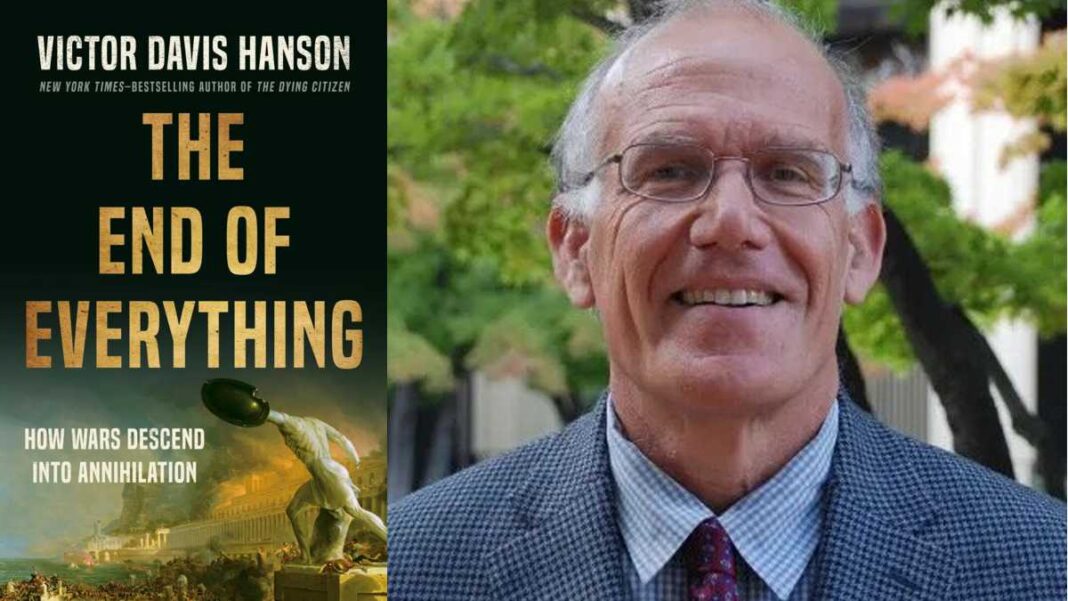A New York Times–bestselling historian charts how and why societies from ancient Greece to the modern era chose to utterly destroy their foes, and warns that similar wars of obliteration are possible in our time
In this “gripping account of catastrophic defeat” (Barry Strauss), a New York Times–bestselling historian charts how and why some societies chose to utterly destroy their foes, and warns that similar wars of obliteration are possible in our time
“In The End of Everything, Hanson tells compelling and harrowing stories of how civilizations perished. He helps us consider contemporary affairs in light of that history, think about the unthinkable, and recognize the urgency of trying to prevent our own demise.” — H. R. McMaster, author of Battlegrounds
War can settle disputes, topple tyrants, and bend the trajectory of civilization—sometimes to the breaking point. From Troy to Hiroshima, moments when war has ended in utter annihilation have reverberated through the centuries, signaling the end of political systems, cultures, and epochs. Though much has changed over the millennia, human nature remains the same. Modern societies are not immune from the horror of a war of extinction.
In The End of Everything, military historian Victor Davis Hanson narrates a series of sieges and sackings that span the age of antiquity to the conquest of the New World to show how societies descend into barbarism and obliteration. In the stories of Thebes, Carthage, Constantinople, and Tenochtitlan, he depicts war’s drama, violence, and folly. Highlighting the naivete that plagued the vanquished and the wrath that justified mass slaughter, Hanson delivers a sobering call to contemporary readers to heed the lessons of obliteration lest we blunder into catastrophe once again.

Review
“Relevant to the modern world by combining granularity with big-picture analysis and teasing out meaning from a mastery of details… [A] profound book.”―Wall Street Journal
“This stupendous book offers a gripping account of catastrophic defeat. Outstanding military historian Victor Davis Hanson takes us through four wars, each of which not only crushed an enemy but destroyed a civilization. Are we doomed to go the way of Thebes, Carthage, the Byzantines, or the Aztecs? To understand the challenges we face, you must read The End of Everything.”―Barry Strauss, author of The War that Made the Roman Empire
“What a paragon and a powerhouse is Hanson! The hymnal tells us of the fate of ‘Earth’s proud empires’ and the poet reminds us of what will happen to ‘our pomp of yesterday,’ yet it takes an historian of Hanson’s intellectual caliber to explain how and why civilizations are annihilated in war, with example after well-researched and cogently written example. As well as Hanson the historian, however, here too is Hanson the philosopher, with his insightful take on how human nature has failed to adapt to our ultra-technological age. Readers will be shocked quite how often total military, cultural, and societal extirpation happens in in our species’ story. We need to learn from this groundbreaking book how to stop it happening to us.”―Andrew Roberts, author of Churchill
“In recent years, we have witnessed man’s inhumanity toward man that many thought had been consigned to the distant past. In The End of Everything, Hanson tells compelling and harrowing stories of how civilizations perished. He helps us consider contemporary affairs in light of that history, think about the unthinkable, and recognize the urgency of trying to prevent our own demise.”―H. R. McMaster, author of Battlegrounds
About the Author
Victor Davis Hanson is Professor of Greek and Director of the Classics Program at California State University, Fresno. He is the author or editor of many books, including Who Killed Homer? The Demise of Classical Education and the Recovery of Greek Wisdom (with John Heath, Free Press, 1998), and The Soul of Battle (Free Press, 1999). In 1992 he was named the most outstanding undergraduate teacher of classics in the nation.









